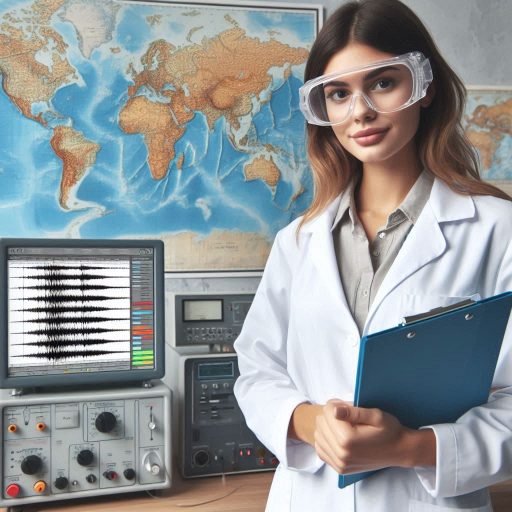Introduction
Attending marine biology conferences is crucial for professionals in this field.
These conferences offer a platform for networking, learning new research, and staying updated on the latest trends.
It provides an opportunity to connect with experts, share knowledge, and collaborate on groundbreaking projects.
Conferences also feature keynote speakers, workshops, and presentations that can enhance professional development.
The networking aspect allows individuals to build relationships with peers and potential collaborators.
Additionally, attending these events can lead to career advancement by showcasing one’s work and gaining recognition within the marine biology community.
Overall, participating in marine biology conferences is a valuable experience that can broaden horizons, foster innovation, and contribute to the overall growth and development of the field.
By staying connected to the global community of marine biologists, professionals can exchange ideas, explore new possibilities, and contribute to the conservation and sustainable use of marine resources.
Conference 1: International Marine Conservation Congress
International Marine Conservation Congress is one of the most prestigious conferences in the field of marine biology.
It brings together scientists, conservationists, policymakers, and students from around the world to discuss pressing issues related to marine conservation.
The highlights and key features of this conference
- Location: The conference is usually held in a different location each year, ranging from coastal cities to tropical islands.
- Dates: The dates vary, but it typically takes place in the summer months to allow for optimal field research opportunities.
- Keynote Speakers: Renowned marine biologists, conservationists, and environmental activists deliver inspiring talks.
Program
The conference offers a diverse program that includes workshops, panels, presentations, and poster sessions.
Attendees have the opportunity to participate in hands-on activities like guided field trips and research demonstrations.
Benefits of attending this specific conference for marine biologists
- Networking: It provides a platform to connect with leading experts and build valuable professional relationships.
- Knowledge Exchange: Participants can learn about the latest research findings, methods, and technologies in marine biology.
- Career Opportunities: The conference offers career development sessions, job fairs, and mentoring programs for early-career scientists.
- Collaboration: Attendees can form collaborations with peers working on similar research interests or conservation projects.
- Inspiration: Hearing from prominent figures in the field can inspire attendees to make a difference in marine conservation efforts.
Read: Challenges and Rewards: The Dual Life of an U.S. Environmental Scientist
Conference 2: Society for Marine Mammalogy
The Society for Marine Mammalogy conference is a premier event in the field of marine biology, specifically focusing on marine mammals.
It serves as a platform for researchers, students, and professionals to come together to share their latest findings, network, and collaborate on research projects.
Overview and Significance
This conference is significant as it brings together experts in the field of marine mammalogy to exchange knowledge.
Discuss emerging trends, and address conservation challenges facing marine mammal populations.
It provides a forum for interdisciplinary collaboration and engagement with stakeholders in the field.
Different Sessions, Symposiums, and Poster Presentations
The Society for Marine Mammalogy conference offers a diverse range of sessions, symposiums, and poster presentations covering a wide array of topics related to marine mammals.
These sessions provide a platform for presenters to showcase their research, engage in discussions, and receive feedback from peers.
Networking Opportunities and Career Resources
Attendees can take advantage of numerous networking opportunities at this conference, including social events, workshops, and organized gatherings.
These allow researchers and students to connect with like-minded individuals, potential collaborators, and mentors in the field.
Additionally, the conference often features career resources such as job postings, professional development workshops, and information on funding opportunities.
Benefits for Researchers and Students Interested in Marine Mammals
For researchers and students interested in marine mammals, attending the Society for Marine Mammalogy conference can be highly beneficial.
It provides an invaluable platform to present research findings, receive constructive feedback, and gain exposure to the latest advancements in the field.
Moreover, the conference offers a unique opportunity to interact with leading experts, establish collaborations, and stay informed about current research trends and conservation efforts in marine mammalogy.
Read: Job Market Trends: Future of Chemistry Jobs in America
Conference 3: European Marine Science Educators Association
The European Marine Science Educators Association (EMSEA) conference focuses on marine science education.
Bringing together educators and researchers who are passionate about sharing knowledge about the marine world with students of all levels.
This conference provides a platform for discussing innovative teaching methods, exchanging ideas, and exploring ways to engage students in marine science.
The focus of the Conference
The primary focus of the EMSEA conference is to enhance marine science education by providing educators with the tools.
Resources, and strategies to effectively teach students about the ocean and its ecosystems.
Participants can expect to deepen their understanding of marine science concepts and learn how to incorporate these concepts into their curriculum.
Workshops, Field Trips, and Collaborative Projects
- Workshops at the EMSEA conference cover a wide range of topics, including hands-on activities, interactive demonstrations, and technology-based tools for teaching marine science.
These sessions are designed to help educators develop new skills and enhance their teaching methods. - Field trips are organized to local marine facilities, research centers, and coastal areas, providing attendees with an opportunity to explore marine environments firsthand and gain practical experience in the field.
These trips offer valuable insights into marine research and conservation efforts. - Collaborative projects allow participants to work together on marine science initiatives, such as curriculum development, educational resources, and research projects.
These projects foster collaboration among educators and researchers, leading to the creation of innovative teaching materials and programs.
Keynote Speakers and Notable Presenters
The EMSEA conference features renowned keynote speakers and notable presenters from the field of marine science education.
These experts share their insights, knowledge, and experiences with attendees, inspiring them to enhance their teaching practices and engage students in marine science.
Benefits for Educators and Researchers
Educators can benefit from attending the EMSEA conference by gaining new teaching strategies, resources, and ideas for incorporating marine science into their curriculum.
They can network with like-minded professionals, collaborate on projects, and stay updated on the latest trends in marine education.
Researchers can benefit from the conference by sharing their findings, engaging with educators, and exploring opportunities for collaboration on marine science projects.
They can receive feedback on their research, connect with potential partners, and contribute to advancing marine science education.
In short, the European Marine Science Educators Association conference offers a unique opportunity for educators and researchers to come together, share knowledge, and enhance marine science education.
By attending this conference, participants can expand their skills, network with professionals, and contribute to advancing marine education worldwide.
Read: Challenges and Rewards: Navigating the Chemist Career Path

Conference 4: World Conference on Marine Biodiversity
Describe the Scope and Scale of This Conference
The World Conference on Marine Biodiversity is a global event, uniting experts in marine science, policy, and conservation.
This conference attracts hundreds of participants from around the world, offering a wide-ranging agenda.
It addresses critical issues like ocean ecosystem health, climate change impacts, and species preservation.
The scale of the event is vast, drawing scientists, researchers, and environmentalists from multiple disciplines to exchange knowledge and innovative solutions.
Highlighting Any Interdisciplinary Sessions or Collaborative Research Opportunities
This conference goes beyond traditional marine biology by integrating interdisciplinary sessions that encourage collaboration across different scientific domains.
Experts in fields such as oceanography, ecology, and environmental policy come together to explore the complexities of marine biodiversity.
These sessions offer opportunities for attendees to engage in cross-disciplinary discussions on challenges like habitat degradation, coral reef protection, and marine species extinction.
Collaborative research initiatives are also highlighted, allowing participants to partner with other institutions and global teams on cutting-edge projects.
The Impact of This Conference on Marine Biodiversity Research and Conservation Efforts
The World Conference on Marine Biodiversity has a profound influence on global conservation efforts.
Many of the ideas and research presented here contribute directly to the development of international marine conservation strategies.
The conference acts as a springboard for new conservation tools, helping researchers and policymakers implement practical solutions.
For instance, past events have catalyzed significant progress in marine protected areas (MPAs) and sustainable fisheries management.
The knowledge shared here ultimately translates into impactful conservation actions that safeguard ocean biodiversity for future generations.
Explain How Attendees Can Contribute to Ongoing Projects and Initiatives in the Field
Attendees of the World Conference on Marine Biodiversity have numerous opportunities to engage with ongoing projects in the marine conservation field.
They can participate in working groups, contribute to roundtable discussions, and collaborate on research proposals.
Additionally, many organizations present ongoing projects, inviting participants to contribute their expertise.
Attendees can support these initiatives through data collection, field research, or policy advocacy, making a tangible impact on marine biodiversity conservation.
Networking events further enhance collaboration, helping to build strong professional connections with fellow marine advocates and researchers.
In a nutshell, the World Conference on Marine Biodiversity is not only a hub for innovative research but also a vital platform for collaborative conservation efforts.
Attendees leave with new insights, expanded professional networks, and opportunities to actively contribute to the preservation of marine life worldwide.
Transform Your Career Today
Unlock a personalized career strategy that drives real results. Get tailored advice and a roadmap designed just for you.
Start NowRead: Diverse Career Paths: From Chemist to Patent Attorney in the US
Learn More: Women in Meteorology: Breaking Barriers and Succeeding
Conference 5: International Coral Reef Symposium
The International Coral Reef Symposium is a prestigious conference that focuses on the latest research and conservation efforts related to coral reefs.
Overview of the Conference
- This conference brings together experts, researchers, and professionals from around the world to discuss various aspects of coral reef ecology and conservation.
- It serves as a platform for sharing knowledge, ideas, and best practices in preserving these vital marine ecosystems.
Focus on Coral Reefs
- The International Coral Reef Symposium places a significant emphasis on coral reefs due to their ecological importance and fragile nature.
- Researchers present cutting-edge findings on coral reef biodiversity, conservation strategies, and the impact of environmental stressors on these ecosystems.
Latest Research Findings and Innovative Technologies
- Attendees can expect to learn about the most recent research findings in coral reef science, including new discoveries about reef species and habitats.
- Scientists also showcase innovative technologies used in coral reef monitoring, mapping, and conservation efforts.
Conservation Strategies
- The conference provides a platform for discussing and developing strategies to address the threats facing coral reefs, such as climate change, pollution, and overfishing.
- Experts present successful conservation initiatives and programs aimed at restoring and protecting coral reef ecosystems.
Workshops, Roundtable Discussions, and Field Trips
- Participants can engage in workshops and roundtable discussions to exchange ideas and collaborate on conservation projects.
- Field trips to local coral reef sites may also be organized to provide attendees with hands-on experience and insights into on-the-ground conservation efforts.
Benefits for Marine Biologists and Conservationists
- Marine biologists and conservationists stand to benefit greatly from attending the International Coral Reef Symposium.
- They can gain valuable knowledge, network with like-minded professionals, and explore potential collaborations to further their research and conservation goals.
Gain More Insights: Space Science and Its Impact on Daily Life
Conclusion
The International Coral Reef Symposium (ICRS) is a leading global conference dedicated to coral reef ecosystems and their conservation.
Held every four years, the ICRS gathers marine biologists, conservationists, and policymakers from around the world to discuss the latest advancements in coral reef research.
The symposium focuses on pressing issues such as climate change impacts on coral reefs, ocean acidification, and biodiversity loss.
Attendees have the opportunity to learn about cutting-edge technologies for reef restoration, such as artificial reefs, coral breeding, and genetic interventions aimed at increasing reef resilience.
In addition to presenting groundbreaking research findings, the ICRS offers a variety of workshops and roundtable discussions that foster collaboration between scientists and conservation practitioners.
These sessions provide attendees with a platform to exchange ideas and develop practical conservation strategies.
Field trips are also an integral part of the conference, offering participants a hands-on experience in observing coral reefs and the challenges they face in their natural environments.
For marine biologists and conservationists, attending the ICRS is invaluable.
It provides opportunities to network with leading experts, stay informed about the latest research, and engage in discussions on the future of coral reefs.
By attending this symposium, professionals in the field gain insights that can shape their work and enhance global efforts to protect and restore coral reef ecosystems.
[E-Books for Sale]
The Big Book of 500 High-Paying Jobs in America: Unlock Your Earning Potential
$19.99 • 500 High-Paying Jobs • 330 pages
Explore 500 high-paying jobs in America and learn how to boost your career, earn more, and achieve success!
See All 500 High-Paying Jobs of this E-Book
1001 Professions Without a Degree: High-Paying American Jobs You Can Start Now
$19.99 • 1001 Professions Without a Degree • 174 pages
Discover 1001 high-paying jobs without a degree! Unlock career tips, skills, and success strategies for just $19.99!




